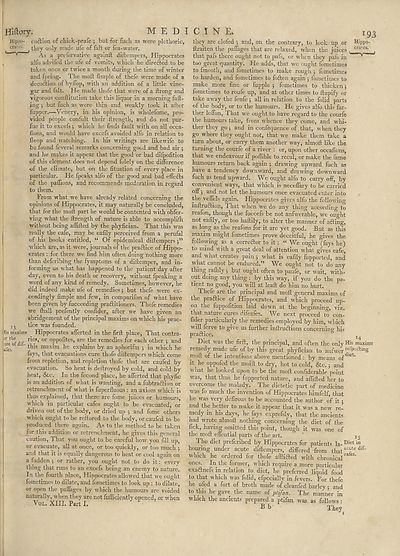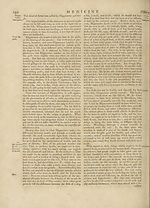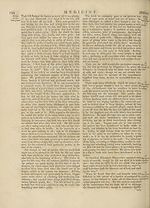Encyclopaedia Britannica, or, a Dictionary of arts, sciences, and miscellaneous literature : enlarged and improved. Illustrated with nearly six hundred engravings > Volume 13, MAT-MIC
(235) Page 193
Download files
Complete book:
Individual page:
Thumbnail gallery: Grid view | List view

Hiftory. MED!
Hippo- co&ion of chick-peafe ; but for fucb as were plethoric,
they only made ufe of fait or fea-water.
As a prefervative againft diftempers, Hippocrates
alfo advifed the ufe of vomits, which he directed to be
taken once or twice a month during the time of winter
and fpring. The molt limple of thefe were made of a
deco&ion of hyffop, wdth an addition of a little vine¬
gar and fait. He made thofe that were of a ftrong and
vigorous conftitution take this liquor in a morning fail¬
ing } but fuch as were thin and weakly took it after
fupper.—Venery, in his opinion, is wholefome, pro¬
vided people confult their ftrength, and do not pur-
fue it to excefs; which he finds fault with on all ocea-
fions, and would have excefs avoided alfo in relation to
fleep and watching. In his writings are likewxfe to
be found feveral remarks concerning good and bad air •,
and he makes it appear that the good or bad difpofition
of this element does not depend folely on the difference
of the climate, but on the fituation of every place in
particular. He fpeaks alfo of the good and bad effects
of the pafllons, and recommends moderation in regard
to them.
From what we have already related concerning the
opinions of Hippocrates, it may naturally be concluded,
that for the moll part he would be contented with obfer-
ving what the ftrength of nature is able to accompliftx
without being a (lifted by the phylician. That this was
really the cafe, may be eafily perceived from a perufal
of his books entitled, “ Of epidemical diftempers j”
which are, as it were, journals of the practice of Hippo¬
crates : for there we find him often doing nothing more
than deferibing the fymptoms of a diftemper, and in¬
forming us what has happened to the patient day after
day, even to his death or recovery, without fpeaking a
word of any kind of remedy. Sometimes, however, he
did indeed make ufe of remedies; but thefe wrere ex¬
ceedingly fimple and few, in comparifon of what have
been given by fucceeding practitioners. Thefe remedies
we (hall prefently confider, after we have given an
abridgement of the principal maxims on which his prac¬
tice was founded.
Hippocrates afferted in the firft place, That contra¬
ries, or oppofites, are the remedies for each other ; and
this maxim he explains by an aphorifm ; in which he
fays, that evacuations cure thofe diftempers which come
from repletion, and repletion thofe that are caufed by
evacuation. So heat is deftroyed by cold, and cold by
heat, &c. In the fecond place, he afferted that phylic
is an addition of what is wanting, and a fubtraCHon or
retrenchment of what is fuperfluous : an axiom which is
thus explained, that there are fome juices or humours,
which in particular cafes ought to be evacuated, or
driven out of the body, or dried up 5 and fome others
which ought to be reftored to the body, or caufed to be
produced there again. As to the method to be taken
for this addition or retrenchment, he gives this general
caution, That you ought to be careful how you fill up,
or evacuate, all at once, or too quickly, or too much 5
and that it is equally dangerous to heat or cool again on
a fudden ; or rather, you ought not to do it: every
thing that runs to an excefs being an enemy to nature.
In the fourth place, Hippocrates allowed that we ought
fometimes to dilate, and fometimes to lock up : to dilate,
or open the paffages by which the humours are voided
naturally, when they are not fufficiently opened, or when
Vgl. XIII. Part I.
*3
is maxims
pr the
are of dif-
C I N E»
they are clofed 5 and, on the contrary, to lock up or
ftraiten the paifages that are relaxed, when the juices
that pafs there ought not to pafs, or when they pais in
too great quantity. He adds, that we ought fometimea
to fmooth, and fometimes to make rough 5 fometimes
to harden, and fometimes to foften again; fometimes to
make more fine or fupple j fometimes to thicken j
fometimes to rbufe up, and at other times to ftupify or
take away the fenfe; all in relation to the folid parts
of the body, or to the humours. He gives alfo this far¬
ther leflon, That we ought to have regard to the courfe
the humours take, from whence they come, and whi¬
ther they go ; and in confequence of that, when they
go where they ought not, that we make them take a
turn, about, or carry them another way, almoft like the
turning the courfe of a river : or, upon other occalions,
that we endeavour if poffible to recal, or make the fame
humours return back again *, drawing upward fuch as
have a tendency downward, and drawing downward
fuch as. tend upward. We ought alfo to carry off, by
convenient ways, that which is neceffary to be carried
off j and not let the humours once evacuated enter into
the veffels again. Hippocrates gives alfo the following
inftrudlion, I hat when we do any thing according to
reafon, though the fuccefs be not anfwerable, we ought
not eafily, or too haftily, to alter the manner of adling,
as long as. the reafons for it are yet good. But as this
maxim might fometimes prove deceitful, he gives the
following as a corre&or to it : “ We ought (fays he)
to mind with a great deal of attention what gives cafe,
and what creates pain } what is eafily fupported, and
what cannot be endured.” We ought not to do any
thing ralhly 3 but ought often to paufe, or wait, with¬
out doing any thing : by this way, if you do the pa¬
tient no good, you will at lead do him no hurt.
Thefe are the principal and moft general maxims of
the pra&ice of Hippocrates, and which proceed up¬
on the fuppofition laid down at the beginning, viz.
that nature cures difeafes. We next proceed to con¬
fider particularly the remedies employed by him, which
will ferve to give us further inftructions concerning his
pradlice. r ^
Diet was the firft, the principal, and often the only Bis maxims
remedy made ufe of by this great phyfician to anfwer refPe(fting
moft of the intentions above mentioned : by means ofdiet°
it he oppofed the moift to dry, hot to cold, &c. 3 and
what he looked upon to be the moft confiderable point
was, that thus he fupported nature, and aflifted her to
overcome the malady. The dietetic part of medicine
was fo much the invention of Hippocrates himfelf, that
he was very defirous to be accounted the author of it 3
and the better to make it appear that it was a new re¬
medy in his days, he fays exprefsly, that the ancients
had wrote almoft nothing concerning the diet of the
fick, having omitted this point, though it was one of
the moft effential parts of the art. " r-
I he diet preferibed by Hippocrates for patients la- Diet 111
bouring under acute diftempers, differed from thatacfedif“
which he ordered for thofe afftidled with chronical eS’
ones. In the former, which require a more particular
exadnefs in relation to diet, he preferred liquid food
to that which was folid, efpecially in fevers. For thefe
he ufed a fort of broth made of cleanfed barley ; and
to this he gave the name of ptifan. The manner in
which the ancients prepared a ptifan was as follows :
B b They
Hippo- co&ion of chick-peafe ; but for fucb as were plethoric,
they only made ufe of fait or fea-water.
As a prefervative againft diftempers, Hippocrates
alfo advifed the ufe of vomits, which he directed to be
taken once or twice a month during the time of winter
and fpring. The molt limple of thefe were made of a
deco&ion of hyffop, wdth an addition of a little vine¬
gar and fait. He made thofe that were of a ftrong and
vigorous conftitution take this liquor in a morning fail¬
ing } but fuch as were thin and weakly took it after
fupper.—Venery, in his opinion, is wholefome, pro¬
vided people confult their ftrength, and do not pur-
fue it to excefs; which he finds fault with on all ocea-
fions, and would have excefs avoided alfo in relation to
fleep and watching. In his writings are likewxfe to
be found feveral remarks concerning good and bad air •,
and he makes it appear that the good or bad difpofition
of this element does not depend folely on the difference
of the climate, but on the fituation of every place in
particular. He fpeaks alfo of the good and bad effects
of the pafllons, and recommends moderation in regard
to them.
From what we have already related concerning the
opinions of Hippocrates, it may naturally be concluded,
that for the moll part he would be contented with obfer-
ving what the ftrength of nature is able to accompliftx
without being a (lifted by the phylician. That this was
really the cafe, may be eafily perceived from a perufal
of his books entitled, “ Of epidemical diftempers j”
which are, as it were, journals of the practice of Hippo¬
crates : for there we find him often doing nothing more
than deferibing the fymptoms of a diftemper, and in¬
forming us what has happened to the patient day after
day, even to his death or recovery, without fpeaking a
word of any kind of remedy. Sometimes, however, he
did indeed make ufe of remedies; but thefe wrere ex¬
ceedingly fimple and few, in comparifon of what have
been given by fucceeding practitioners. Thefe remedies
we (hall prefently confider, after we have given an
abridgement of the principal maxims on which his prac¬
tice was founded.
Hippocrates afferted in the firft place, That contra¬
ries, or oppofites, are the remedies for each other ; and
this maxim he explains by an aphorifm ; in which he
fays, that evacuations cure thofe diftempers which come
from repletion, and repletion thofe that are caufed by
evacuation. So heat is deftroyed by cold, and cold by
heat, &c. In the fecond place, he afferted that phylic
is an addition of what is wanting, and a fubtraCHon or
retrenchment of what is fuperfluous : an axiom which is
thus explained, that there are fome juices or humours,
which in particular cafes ought to be evacuated, or
driven out of the body, or dried up 5 and fome others
which ought to be reftored to the body, or caufed to be
produced there again. As to the method to be taken
for this addition or retrenchment, he gives this general
caution, That you ought to be careful how you fill up,
or evacuate, all at once, or too quickly, or too much 5
and that it is equally dangerous to heat or cool again on
a fudden ; or rather, you ought not to do it: every
thing that runs to an excefs being an enemy to nature.
In the fourth place, Hippocrates allowed that we ought
fometimes to dilate, and fometimes to lock up : to dilate,
or open the paffages by which the humours are voided
naturally, when they are not fufficiently opened, or when
Vgl. XIII. Part I.
*3
is maxims
pr the
are of dif-
C I N E»
they are clofed 5 and, on the contrary, to lock up or
ftraiten the paifages that are relaxed, when the juices
that pafs there ought not to pafs, or when they pais in
too great quantity. He adds, that we ought fometimea
to fmooth, and fometimes to make rough 5 fometimes
to harden, and fometimes to foften again; fometimes to
make more fine or fupple j fometimes to thicken j
fometimes to rbufe up, and at other times to ftupify or
take away the fenfe; all in relation to the folid parts
of the body, or to the humours. He gives alfo this far¬
ther leflon, That we ought to have regard to the courfe
the humours take, from whence they come, and whi¬
ther they go ; and in confequence of that, when they
go where they ought not, that we make them take a
turn, about, or carry them another way, almoft like the
turning the courfe of a river : or, upon other occalions,
that we endeavour if poffible to recal, or make the fame
humours return back again *, drawing upward fuch as
have a tendency downward, and drawing downward
fuch as. tend upward. We ought alfo to carry off, by
convenient ways, that which is neceffary to be carried
off j and not let the humours once evacuated enter into
the veffels again. Hippocrates gives alfo the following
inftrudlion, I hat when we do any thing according to
reafon, though the fuccefs be not anfwerable, we ought
not eafily, or too haftily, to alter the manner of adling,
as long as. the reafons for it are yet good. But as this
maxim might fometimes prove deceitful, he gives the
following as a corre&or to it : “ We ought (fays he)
to mind with a great deal of attention what gives cafe,
and what creates pain } what is eafily fupported, and
what cannot be endured.” We ought not to do any
thing ralhly 3 but ought often to paufe, or wait, with¬
out doing any thing : by this way, if you do the pa¬
tient no good, you will at lead do him no hurt.
Thefe are the principal and moft general maxims of
the pra&ice of Hippocrates, and which proceed up¬
on the fuppofition laid down at the beginning, viz.
that nature cures difeafes. We next proceed to con¬
fider particularly the remedies employed by him, which
will ferve to give us further inftructions concerning his
pradlice. r ^
Diet was the firft, the principal, and often the only Bis maxims
remedy made ufe of by this great phyfician to anfwer refPe(fting
moft of the intentions above mentioned : by means ofdiet°
it he oppofed the moift to dry, hot to cold, &c. 3 and
what he looked upon to be the moft confiderable point
was, that thus he fupported nature, and aflifted her to
overcome the malady. The dietetic part of medicine
was fo much the invention of Hippocrates himfelf, that
he was very defirous to be accounted the author of it 3
and the better to make it appear that it was a new re¬
medy in his days, he fays exprefsly, that the ancients
had wrote almoft nothing concerning the diet of the
fick, having omitted this point, though it was one of
the moft effential parts of the art. " r-
I he diet preferibed by Hippocrates for patients la- Diet 111
bouring under acute diftempers, differed from thatacfedif“
which he ordered for thofe afftidled with chronical eS’
ones. In the former, which require a more particular
exadnefs in relation to diet, he preferred liquid food
to that which was folid, efpecially in fevers. For thefe
he ufed a fort of broth made of cleanfed barley ; and
to this he gave the name of ptifan. The manner in
which the ancients prepared a ptifan was as follows :
B b They
Set display mode to:
![]() Universal Viewer |
Universal Viewer | ![]() Mirador |
Large image | Transcription
Mirador |
Large image | Transcription
Images and transcriptions on this page, including medium image downloads, may be used under the Creative Commons Attribution 4.0 International Licence unless otherwise stated. ![]()
| Permanent URL | https://digital.nls.uk/192664217 |
|---|
| Attribution and copyright: |
|
|---|
| Description | Ten editions of 'Encyclopaedia Britannica', issued from 1768-1903, in 231 volumes. Originally issued in 100 weekly parts (3 volumes) between 1768 and 1771 by publishers: Colin Macfarquhar and Andrew Bell (Edinburgh); editor: William Smellie: engraver: Andrew Bell. Expanded editions in the 19th century featured more volumes and contributions from leading experts in their fields. Managed and published in Edinburgh up to the 9th edition (25 volumes, from 1875-1889); the 10th edition (1902-1903) re-issued the 9th edition, with 11 supplementary volumes. |
|---|---|
| Additional NLS resources: |
|

